Annapolis, MD; August 18, 2025—The Entomological Society of America congratulates the recipients of its 2025 awards. ESA Awards & Honors recognize scientists, educators, and students who have distinguished themselves through their contributions to entomology. Award honorees will be showcased during Entomology 2025, November 9-12 in Portland, Oregon.
Earlier this year, ESA also named the entomologists receiving the following honors:
Professional Awards
Award for Excellence in Integrated Pest Management
This award, which is sponsored by Syngenta Crop Protection, recognizes outstanding contributions that have a direct relation to integrated pest management.
Cesar Rodriguez-Saona
Rutgers University
Cesar Rodriguez-Saona, Ph.D., is a professor and extension specialist in the Department of Entomology at Rutgers University. He earned a B.S. in biology from Universidad Nacional Agraria in Lima, Peru; an M.S. in entomology from Oregon State University; and a Ph.D. from the University of California, Riverside. He completed postdoctoral research at the USDA Cotton Research Laboratory, the University of Toronto, and Michigan State University before joining Rutgers in 2005. His research focuses on developing cost-effective, reduced-risk pest management strategies for blueberries and cranberries. He integrates chemical, behavioral, and biological control methods while advancing ecological understanding of insect pests and their natural enemies. His extension program delivers actionable strategies to growers through on-farm trials, presentations, and newsletter articles. Rodriguez-Saona has authored 169 peer-reviewed papers, 26 book chapters and invited articles, and 121 trade or extension publications. He co-teaches the undergraduate course "Insect Ecology and Evolution" and has mentored 34 graduate students, trained 13 postdoctoral researchers, supervised 23 undergraduates, and hosted 12 visiting scholars. He has secured over $9 million in competitive and noncompetitive research funding. He has served in leadership roles within the Entomological Society of America, including as president of both the Eastern Branch and the Plant-Insect Ecosystems Section. He has chaired the ESA Awards and Honors and Diversity, Equity, and Inclusion committees. Rodriguez-Saona currently serves on the Editorial Board of the Journal of Economic Entomology and as a subject editor for Environmental Entomology.
Distinguished Achievement Award in Extension
This annual award recognizes outstanding contributions to extension entomology.
 Jody Green
Jody Green
University of Nebraska-Lincoln
Jody Green, Ph.D., is an extension educator at the University of Nebraska-Lincoln, blending scientific expertise with creative outreach to transform how people understand and manage arthropods. She holds a Ph.D. in entomology from Purdue University, and her interdisciplinary background in gerontology and environmental pest management enriches her approach to public health and urban IPM.
With over 20 years of experience, Green's roles have ranged from pest control technician to consultant, shaping her practical, community-focused work. Her efforts have increased awareness and created safer, more understanding environments for those dealing with bed bugs. By educating school boards, nurses, and superintendents about infestations, she has fostered compassionate policies that protect families from judgment and discrimination, ensuring students can stay in school while receiving needed support.
Green co-hosts the popular "Arthro-Pod" podcast and appears regularly on the garden show "Backyard Farmer," making entomology accessible and engaging. Her creative projects, like "A Bug's Life fact sheets" and multilingual materials, showcase her commitment to impactful science communication. Through her work, Green exemplifies the power of education and community engagement, inspiring comments like, "Because of you, I'm less afraid." Her tagline, "Stop and think before you step on a bug," captures her mission to foster appreciation and understanding of the insect world.
Distinguished Achievement Award in Teaching
This award is presented annually to the member of the Society deemed to be the most outstanding teacher of the year.
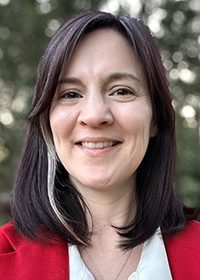 Louise Lynch-O'Brien
Louise Lynch-O'Brien
University of Nebraska–Lincoln
Louise Lynch-O'Brien, Ph.D., is an associate professor in the Department of Entomology at the University of Nebraska–Lincoln, where she holds a 70% teaching and 30% extension appointment. Her approach to teaching centers on experiential learning, inclusion, and cultivating curiosity—particularly through community-based, interdisciplinary engagement with insects and arthropods. She teaches a variety of undergraduate courses including insect biology, extension experience in entomology, and a suite of experiential learning seminars focused on teaching, extension, and research.
Lynch-O'Brien mentors over 35 undergraduate advisees at a time and has served on more than 10 graduate student committees across disciplines. Her work bridges academic learning and public service, incorporating One Health and science communication in both classroom and outreach environments. Through grants and initiatives such as One Health programming and the Indigenous Youth Food Sovereignty Program, she fosters student involvement in real-world problem-solving and career preparation.
Regarded by her students for her accessibility, creativity, and passion, Lynch-O'Brien has received multiple campus-level awards recognizing her commitment to student development and inclusive pedagogy. Her scholarship and invited presentations explore themes of citizen science, entomology literacy, and the evaluation of learning in informal education settings. She remains an active contributor to the Entomological Society of America's educational mission.
Nan-Yao Su Award for Innovation and Creativity in Entomology
Each year this award is given to an ESA member who is able to demonstrate through his or her projects or accomplishments an ability to identify problems and develop creative, alternative solutions that significantly impact entomology.
Daniel Swale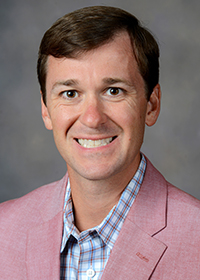
University of Florida
Daniel Swale, Ph.D., received his B.S. degree in biological sciences at Christopher Newport University, an M.S. degree in life sciences from Virginia Tech, a Ph.D. degree in insect toxicology from University of Florida, and a postdoctoral fellowship in neuropharmacology at Vanderbilt University. Swale served on the faculty at Louisiana State University for eight years and transferred to the University of Florida as an associate professor in the Emerging Pathogens Institute and the Department of Entomology and Nematology. His current research program lies at the interface of physiology, toxicology, and molecular genetics to provide knowledge on the modes of action, discovery and development, and resistance of insecticides. The Swale Lab studies the fundamental and applied aspects of physiology and toxicology by integrating pharmacological, electrophysiological, and genomic approaches to address broad-ranging hypotheses in model insects, arthropod vectors of human diseases, and agricultural pests. Knowledge gained by the lab's various projects will aid in exploiting the plasticity of insect systems to facilitate the development of novel technologies for arthropod control (e.g., vectors of human/plant pathogens) or for enhancement of arthropod systems (e.g., honey bee health).
Swale is a past president of the Physiology, Biochemistry, and Toxicology Division of the Entomological Society of America, a Fellow for the Agrochemical Division of the American Chemical Society, and the associate director of special projects for the Emerging Pathogens Institute. He serves as an executive editor for Pest Management Science and associate editor for Pesticide Biochemistry and Physiology. He spends his free time fishing, hunting, or diving in the Gulf of America.
Science Communication Award
This award honors impactful and innovative communication projects or programs that engage diverse public audiences with entomology-related scientific information.
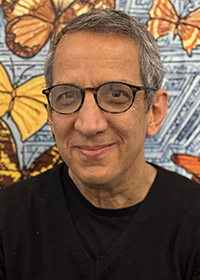 Peter Kuper
Peter Kuper
Peter Kuper Art
Peter Kuper's illustrations and comics have appeared in newspapers and magazines around the world. He is a regular contributor to The New Yorker, The New York Times, The Nation, and MAD, where he has written and illustrated "Spy vs. Spy" since 1997.
Kuper is the co-founder and co-editor of World War 3 Illustrated, a political graphics magazine that has given a forum to political artists for over four decades. He has produced over two dozen books, among them Ruins, Diario de Oaxaca, and The System, as well as adaptations of many of Franz Kafka's works into comics, including The Metamorphosis and Kafkaesque. His latest graphic novel, Insectopolis, is a history of insects and the people who have studied them.
He has lectured and exhibited his work in the United States and abroad and teaches cartooning at Harvard University.
ESA Certification Corporation Awards
ACE Professional Award
This award recognizes superior contributions of an Associate Certified Entomologist in the field of structural pest management.
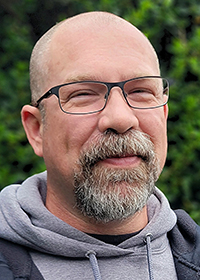 Christopher Somers
Christopher Somers
Rambo Total
Somers started his career as a technician in 2013, when Rambo Total Pest Control consisted of four employees. As the company grew, he advanced to be the organization's first lead technician in 2016, then its first service manager in 2020. Somers currently oversees 17 technicians, three lead technicians, a training team, and a termite team, along with a multi-unit and commercial specialist team.
In 2017, Somers tested one year early for the ACE exam, knowing that the credentials would not be active until the five-year experience requisite. He passed on his first attempt and has continued his path of learning ever since. After five years in the industry, Somers renewed his pesticide operator license for the first time, with over 100 additional credits to the WSDA's minimum CEU requirements.
Over the past three years, Somers has been a speaker and field trainer at WSPMA events, covering subjects such as exclusion, rodents, and related topics—most recently in September 2024 at the WSPMA Rodent Academy.
Somers' technical knowledge has led him to be interviewed for articles written by Pacific NW Magazine, South Sound Talks, PCT Magazine, and The Seattle Times. He was also recognized as a PCT Technician-of-the-Year finalist in 2019.
Somers' dedication to his team's success is shown through extensive support with training and education. He has created technical application training events for hands-on learning and continues to assist each technician in advancing their personal areas of professional interest.
Distinguished Service Award to the Certification Program
The purpose of this award is to encourage, recognize, and reward outstanding contributions to the ESA Certification Program and the professionalism of entomology.
Shripat Kamble
University of Nebraska
Shripat Kamble, Ph.D., received his Ph.D. in entomology from North Dakota State University. He served the University of Nebraska-Lincoln for 36 years as a professor of entomology, faculty fellow, and IR-4 state liaison. Kamble's research focuses on environmental fate of termiticides, baiting technology, molecular ecology/genetics, and insecticide resistance. He made significant contributions to determine movement and degradation of termiticides in soil, and insecticide bioefficacy against termites, cockroaches, ants, and bed bugs. He advised eight M.S. and 11 Ph.D. graduates and served on three Ph.D. supervisory committees. Kamble authored 157 papers, made 205 presentations, and organized 53 symposia. He received $3.77 million in grants for his research and extension programs.
His contributions to NCB-ESA include co-chair of local arrangements (2012), executive member-at-large (2007-2009), Awards Committee chair (1994), Program Committee member (1993-1999), and Graduate Student Awards Committee member (1991). He provides leadership to urban entomology at the branch level. Kamble has participated in every NCB meeting since 1979.
Kamble's significant contributions to ESA include Section-F Governing Board member (2001-2006), subject editor for Arthropod Management Tests (2008-current), director of the Certification Program (2012, 2000), and chair of the BCE Examining Committee (2004-current). He served the National Conference on Urban Entomology as conference chair (2000) and program chair (1998).
He received 39 awards/recognitions, including honorary ESA member, Distinguished Achievements-Urban Entomology, director of ESA Certification, national recognition in urban entomology, NCB CV Riley, and NCB Award of Merit, among others.
Early Career Professional (ECP) Awards
Henry and Sylvia Richardson Research Grant
This grant provides research funds to postdoctoral ESA members who have at least one year of promising work experience, are undertaking research in selected areas, and have demonstrated a high level of scholarship.
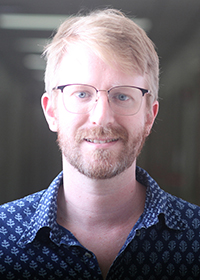 Matthew Hetherington
Matthew Hetherington
Kansas State University
Matthew Hetherington, Ph.D., is a postdoctoral researcher in the Department of Entomology at Kansas State University working with Rob Morrison, Ph.D., Alison Gerken, Ph.D., Deanna Scheff, Ph.D., and Tom Phillips, Ph.D. to optimize monitoring and management practices for quarantined stored product beetles. Hetherington earned a B.Sc. in biology from the University of Memphis and M.Sc. in biology from the University of Arkansas at Little Rock before completing his Ph.D. in entomology at the University of Wisconsin–Madison in 2023. His doctoral research under the guidance of Christelle Guédot, Ph.D., focused on the sensory ecology and management of Lygus lineolaris and Lygus hesperus.
In his current role, Hetherington investigates strategies for real-time, autonomous monitoring of quarantined stored product beetles and optimizes the use of emerging fumigant technologies to manage these biosecurity threats. He also applies metabolomic analyses alongside behavior assays to examine the role of natural enemy kairomones in mediating nonconsumptive effects of natural enemies in postharvest agroecosystems. He has published 10 peer-reviewed publications, received $150,000 in extramural funding, and provided research mentorship to 17 students.
Early Career Innovation Award
This award honors young professionals working within the field of entomology who have demonstrated innovation through contributions within any area of specialization (research, teaching, extension, product development, public service, etc.).
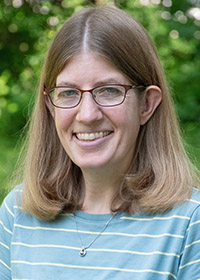 Allison Gardner
Allison Gardner
University of Maine
Allison Gardner, Ph.D., is an associate professor in the School of Biology and Ecology at the University of Maine. She completed her Ph.D. in entomology at the University of Illinois Urbana-Champaign, M.S. in behavioral science at the London School of Economics, and B.A. at Williams College.
The major focus of Gardner's research is the impacts of human behavior and decision-making on vector-borne pathogen transmission in natural resource economies. She has led multiple interdisciplinary projects investigating tick-borne disease ecology and management on private woodland and feedbacks between human mobility and mosquito-borne virus spread in the nature-based tourism industry. Gardner also leads research on tick control in residential settings, integrating entomology, psychology, and economics, as a founding member of the New England Regional Center of Excellence for Vector-Borne Disease. She has pursued her interest in the adoption of scientific research findings at the policy level as an ESA Science Policy Fellow.
Teaching is Gardner's favorite part of her position, and she regularly teaches undergraduate courses in introductory entomology and emerging infectious disease and a graduate-level applied statistics course. She has mentored two postdoctoral researchers, four Ph.D. students, nine M.S. students, and dozens of undergraduates in independent research, and serves as program coordinator for an interdisciplinary graduate program in ecology and environmental sciences.
Gardner would like to thank her graduate school mentors, Brian Allan, Ph.D., Juma Muturi, Ph.D., and May Berenbaum, Ph.D., as well as her University of Maine colleagues, especially Andrei Alyokhin, Ph.D., and Jessica Leahy, Ph.D., for their support and encouragement.
ECP Extension, Outreach, and Engagement Award
This award honors a student transition or early professional working within the field of entomology who has demonstrated excellence, leadership, and creativity in extension, outreach, and public engagement.
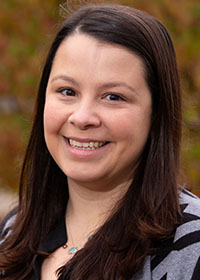 Patricia Prade
Patricia Prade
Penn State
Patricia Prade, Ph.D., is an extension entomologist with Penn State Extension, where she develops and delivers statewide programming on integrated pest management, invasive species detection and management, and biological control for the green industry and specialty crops. She creates impactful resources—from in-person workshops and field demonstrations to online courses and publications—that help growers, landscapers, educators, and homeowners make informed, science-based decisions.
She previously served as a postdoctoral associate at Rutgers University under Cesar Rodriguez-Saona, Ph.D., where she worked on classical biological control of spotted wing drosophila in blueberries. She earned her B.S. and M.Sc. degrees in forestry engineering from the Regional University of Blumenau in Brazil, supervised by Marcelo Vitorino, Ph.D., and a Ph.D. in entomology from the University of Florida under Carey Minteer, Ph.D.. Her doctoral research focused on evaluating potential classical biological control agents for Brazilian peppertree in Florida.
Prade works closely with state agencies, industry partners, and research faculty to develop responsive programming that addresses emerging pest challenges. She chairs the Pennsylvania Governor's Invasive Species Council Communications Committee and the Mid-Atlantic Fruit and Vegetable Convention Small Fruit Sessions.
An ESA member since 2016, Prade has contributed to regional and national initiatives supporting education, communication, and professional development within the entomological community. She has held leadership roles on several committees, including the Student Affairs Committee, Awards and Honors Canvassing Committee, and Entomology Games.
ECP Research Award
This award recognizes a student transition or early professional who has made outstanding research contributions to the field of entomology.
 Sajjan Grover
Sajjan Grover
Bayer Crop Science
Sajjan Grover, Ph.D., is a senior scientist at Bayer Crop Science, focused on hemipteran discovery projects. He earned his M.S. in entomology from Punjab Agricultural University, India, and completed his Ph.D. in entomology at the University of Nebraska–Lincoln in 2021 under the guidance of Joe Louis, Ph.D..
Grover began his career at Bayer in 2022 as a scientist II on the In Vitro Insect Testing Team and transitioned to his current role in 2023. His research focuses on insect physiology and molecular plant-insect interactions. With over 12 years of experience, he has worked extensively with a wide range of hemipteran pests, along with short-term projects involving lepidopterans and thysanopterans. His expertise spans from basic molecular studies to controlled-environment testing. In his current role at Bayer, he mentors graduate students as interns/co-ops every year.
He has authored 23 peer-reviewed publications and four book chapters, with several additional manuscripts in progress. Since 2017, he has been a regular participant at ESA meetings, contributing in various capacities—including presenting research, competing in Student Debates and Entomology Games, organizing symposia, judging student competitions, and serving on multiple committees. He currently serves as a member-at-large on the ESA Leadership Development Committee and as the NCB representative on the ESA Diversity, Equity, and Inclusion Committee.
Grover is passionate about developing novel and sustainable pest management solutions for agricultural pests. His work has earned him numerous recognitions at the university, company, and ESA levels.
ECP Teaching and Mentoring Award
This award is given to a student transition or early professional who excels in entomological education and/or mentoring. This award recognizes their dedication to fostering the next generation of entomologists.
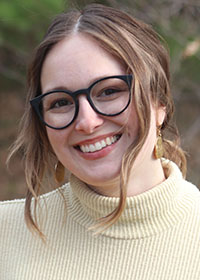 Jessica Kansman
Jessica Kansman
Montana State University
Jessica Kansman, Ph.D., is an assistant professor of entomology in the Department of Plant Sciences and Plant Pathology at Montana State University. She received a B.S. in entomology from Michigan State University (MSU), where she was first exposed to research, teaching, and outreach with Zsofia Szendrei, Ph.D., Jared Ali, Ph.D., and Amanda Lorenz, Ph.D.. She completed her Ph.D. at the University of Missouri in 2020 with Deborah Finke, Ph.D., and was awarded a NIFA predoctoral fellowship for her work on abiotic stress and trophic interactions. She also received a minor in college science teaching, for which she conducted research on equitable teaching practices resulting in a publication. Her dedication to community building was recognized when she received a campus-wide award for student leadership. As a postdoc at Penn State University (PSU) with Sara Hermann, she received a NIFA postdoctoral fellowship to investigate chemical ecology and predator-prey interactions. While at PSU, she developed an insect ecology seminar encouraging creative approaches to disseminating research papers, such as song parodies and poetry.
Since beginning at MSU in 2023, Kansman has redesigned two key courses: an undergraduate core science course called "Insects and Human Society" and a split graduate-undergraduate course on "Insect Ecology." She has mentored 25 students over her academic career, including the five incredible students currently in the lab. She sets an example of mindful mentoring for her graduate students that the graduate students employ with the undergraduates, resulting in a "top-down cascade" of mentoring that cultivates a safe environment for failure and discovery.
Student Awards
Alate Award
This grant honors students currently enrolled at Historically Black Colleges and Universities and other Minority-Serving Institutions, to promote interest in entomology and to stimulate interest in attending the ESA Annual Meeting.
- Rattanan Chungsawat, University of California, Riverside
- Charly Hartle, Virginia Tech
- Fang-Ling Chloe Liu, Virginia Tech
- Robin Marquez, University of Central Florida
- Emily Ta, University of California, Riverside
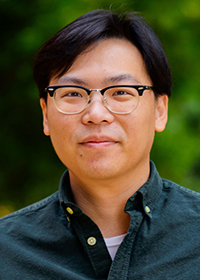 Rattanan Chungsawat
Rattanan Chungsawat
University of California, Riverside
Rattanan Chungsawat is a graduate student in the Department of Entomology at the University of California, Riverside (UCR), under the supervision of Chow-Yang Lee, Ph.D. Having grown up in Bangkok, Thailand, he understands the impact of insect pests like cockroaches and termites and the challenges of managing them in urban environments. His dissertation focuses on developing alternative, low-cost, and low-impact strategies for controlling the German cockroach. He aims to reduce the heavy reliance on synthetic and semisynthetic insecticides, which German cockroaches can quickly develop resistance to, and improve access to pest management programs for low-income communities.
Beyond his dissertation, Chungsawat works on insecticide evaluation projects and field sampling with other urban pests, including bed bugs, other species of cockroaches, and termites. He has presented his research at conferences and is an active member of the Entomological Society of America. In addition, he serves on the social committee of the UCR Entomology Graduate Student Association. He also mentors undergraduate students, helping them gain hands-on experience in urban entomology research.
His contributions have been recognized with several awards, including the UCR Vice Provost Excellence Fellowship, the Francis A. & Jane Davies Gunther Endowed Graduate Award in Entomology, and the Carl Strom/Western Exterminator Scholarship. Through his research, Chungsawat hopes to advance pest management strategies and bridge the gap between academia and real-world applications to achieve sustainable and accessible solutions.
Charly Hartle began their academic journey with scientific illustration, where they discovered a passion for entomology through art. Their master's research focused primarily on the characterization of RNA viruses of the odorous house ant, Tapinoma sessile, and the viruses' effects on colony foraging behavior. Hartle is now a Ph.D. student in the Entomology Department at Virginia Tech, where their research focuses on the behavioral ecology of the myrmecophilous cricket, Myrmecophilus pergandei. Hartle explores how this obligate generalist kleptoparasite successfully interacts with and integrates into ant colonies of various species, including T. sessile, to exploit colony resources. Through this work, they aim to illuminate the hidden interactions within ant colonies and improve understanding of interspecies communication, symbiosis, and host-parasite dynamics. Their long-term goal is to integrate research, teaching, outreach, and visual communication to blend science with art and foster public fascination with insects that ultimately leads to more informed and positive interactions with insects.
Fang-Ling Chloe Liu
Virginia Tech
Fang-Ling Chloe Liu is a Ph.D. candidate in entomology at Virginia Tech, advised by Chin-Cheng Scotty Yang, Ph.D. Originally from Taiwan, Liu is a first-generation international student. She earned her master's degree from National Chung Hsing University, where she studied the population dynamics of a globally invasive wood-boring pest and its natural enemies in Taiwan. Building on this foundation, her doctoral research focuses on host–virus interactions in the red imported fire ant, examining how viral infections affect ant behavior, nutrition ecology, and baiting efficiency to improve pest control strategies.
Liu's academic accomplishments include authoring several peer-reviewed publications, including two invited review articles. Her work has been presented at numerous conferences, where she earned first place in the Student 10-Minute Presentation Competition at the annual Entomological Society of America meeting. She has also received multiple scholarships, travel awards, and research grants at the university, state, and national levels. Most notably, she was recently honored with the 2025 Shripat Kamble Urban Entomology Graduate Student Award.
Outside research, Liu is committed to outreach and education. She leads hands-on invasive ant activities at public science events for audiences of all ages, including K–12 students, families, and the general public. She also mentors undergraduate students in the lab, reflecting her dedication to science communication, leadership, and broader impacts.
Robin Marquez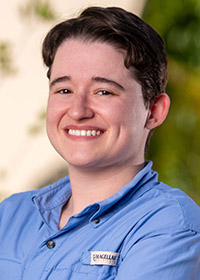
University of Central Florida
Robin Marquez is a senior undergraduate student at the University of Central Florida and assistant for the university's Collection of Arthropods. His research aims to explore parasitoid wasp biodiversity and ecology, and address broader questions related to the evolutionary ecology of parasitic insects.
A first-generation and nontraditional student, Marquez became the first Valencia College student to be recognized as a Barry Goldwater Scholar before transferring to the University of Central Florida as a McNair Scholar. He has developed a comprehensive range of field, lab, and curation techniques through his work across several leading research institutions. Recent projects include cryptic species delimitation in the parasitoid genus Ormyrus, a survey of neotropical parasitoid biodiversity in leaf litter, and investigating relationships between the herbicide dicamba and agricultural plant-arthropod interactions. Marquez has been an author or co-author of more than 25 research presentations and four manuscripts in progress.
In addition to his research, Marquez strives to broaden public access and engagement in entomology. His science communication training from the Hubbard Brook Research Foundation and Audubon Florida has translated into engaging collection tours, outreach, and educational programming for audiences such as the National Museum of Natural History, Kennedy Space Center, and the Florida Department of Environmental Protection. He has mentored numerous students and collection volunteers in curation, public science communication, and undergraduate research.
Marquez is grateful to the Entomological Society of America for this opportunity and recognition, which will inspire his continued dedication to advancing scientific knowledge while promoting a sense of belonging in entomology.
Emily Ta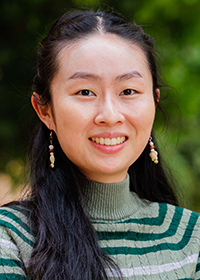
University of California, Riverside
Emily Ta is a Ph.D. student studying urban entomology in the lab of Chow-Yang Lee, Ph.D., at the University of California, Riverside (UCR). Her research focuses on the behavioral response of German cockroaches toward insecticidal gel baits. Gel baits are the most effective and commonly used insecticide formulation against German cockroaches, an economical and challenging pest to control, which means it is important to investigate their behavioral and neuronal response when exposed to gel baits.
Ta graduated with her bachelor of science degree in biology at UCR. Ta originally was interested in pursuing medicine. After taking a general entomology class with Lee during her last quarter as an undergraduate student, she realized that she could make an impact on society through applied entomology. Ta then worked as a lab assistant for a year in Lee's lab by rearing urban pest cockroaches and common bed bugs, and collecting subterranean termites and Argentine ants. She was heavily involved in evaluating insecticide products on German cockroaches and Argentine ants before she started graduate school. This also led to publishing a paper as a co-author on a new active ingredient, called isocycloseram, against German cockroaches.
Ta is also passionate about community service, outreach, mentoring, and teaching. She is currently the ESA MUVE Student Affairs representative and DEI Committee student representative. At her university, she serves multiple leadership roles for the Entomology Graduate Student Association. One of her goals in outreach is to break the negative stigma of cockroaches because only a few are considered pests.
The Larry Larson Graduate Student Award for Leadership in Applied Entomology
This ESA award, sponsored by Corteva, recognizes Larry Larson's role as a leader and pioneer in insect management and carries that legacy to the next generation of leaders in applied entomology.
Alexis Alsdorf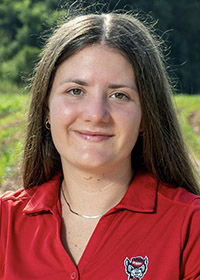
North Carolina State University
Alexis Alsdorf is a Ph.D. student at North Carolina State University (NC State) under the mentorship of Dominic Reisig, Ph.D. She earned her B.S. in agronomy with a minor in food and agribusiness management from Purdue University and completed her M.S. in entomology at NC State. Alsdorf is committed to supporting growers through applied agricultural research.
Her current research focuses on how different refuge strategies in Bt corn affect the biology and behavior of Helicoverpa zea (corn earworm or bollworm), a major pest in the southern United States. Bt corn expresses insecticidal proteins to reduce pesticide use, but poor refuge management can accelerate pest resistance. To help delay resistance, growers use either structured (separate non-Bt blocks) or blended (Bt and non-Bt seed mixed in the same field) refuges. However, seed blends can result in cross-pollination and sublethal Bt exposure, which may influence pest development and mating behaviors. Alsdorf investigates how H. zea from different refuge types vary in traits such as mating success, male pheromone response, and spermatophore production, which are factors that influence how resistance spreads. Through a combination of lab and field research, her work aims to inform EPA refuge guidelines and strengthen insect resistance management strategies.
Alsdorf enjoys engaging directly with growers to understand and address their challenges. She is also active in ESA, having served on the national Student Affairs Committee and as chair of the SEB SAC. She is honored to receive the Larry Larson Graduate Student Award for Leadership in Applied Entomology.
Lillian and Alex Feir Graduate Student Travel Award in Insect Physiology, Biochemistry, or Molecular Biology
The purpose of this ESA award is to encourage graduate students working with insects or other arthropods in the broad areas of physiology, biochemistry, and molecular biology to affiliate with ESA's Integrative Physiological and Molecular Insect Systems Section and to attend the ESA Annual Meeting.
Flinn O'Hara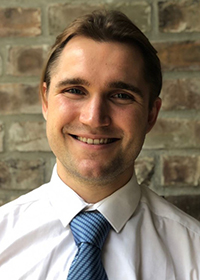
University of Florida
Flinn O'Hara is currently a Ph.D. candidate in the Department of Entomology and Nematology at the University of Florida, where he is supervised by Daniel Swale, Ph.D. His dissertation project combines molecular, physiological, and toxicological approaches to discover and develop novel mode and mechanism insecticides that kill or prevent plant feeding that will reduce horizontal transmission of plant pathogens by hemipteran pests. O'Hara is currently undertaking a six-month internship at Bayer Crop Science that centers around hemipteran discovery projects. Supervised by Sajjan Grover, Ph.D., this research focuses on aspects of insect feeding, physiology, and plant-insect interactions. O'Hara previously received an M.S. in entomology from Louisiana State University (LSU) in 2022, in which his thesis research focused on measuring changes in aphid feeding biology after exposure to insecticides.
O'Hara has been an active contributor to the scientific community throughout his Ph.D. and M.S. program, where he has organized and moderated multiple symposia at ESA national meetings. He has held numerous leadership roles throughout his graduate career. Most notably, he has contributed professionally as an ESA Student Affairs Committee PBT representative, PBT Science Policy representative, and LSU Entomology Club president. Prior to graduate school, O'Hara worked in the urban pest management field at Rentokil Pest Control, which taught him the importance of tailoring management strategies to meet the needs of the customer. O'Hara has a passion in research focusing on insect physiology, toxicology, and feeding behavior and aspires to apply this fundamental scientific knowledge to solve real-world agricultural challenges through sustainable solutions.
Student Activity Award
Sponsored by Bayer, this award will be presented annually to recognize a student for outstanding contributions to the Society, their academic department, and the community, while still achieving academic excellence.
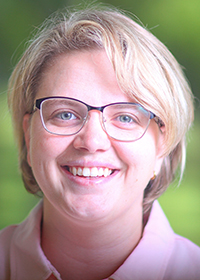 Jacqueline Maille
Jacqueline Maille
Kansas State University
Jacqueline Maille, originally from Lum, Michigan, received her B.S. in biology at Austin Peay State University in 2016. Currently, she is a Ph.D. candidate in the Department of Entomology at Kansas State University (KSU) and a USDA-NIFA predoctoral fellow, co-advised by Erin Scully, Ph.D. (USDA-ARS), Rob Morrison, Ph.D. (USDA-ARS), and Kun Yan Zhu, Ph.D. (KSU). Her research focuses on identifying knowledge gaps in the sensory biology of stored product insects to inform behaviorally based management practices. With a strong interest in integrated pest management, Maille also contributes to research on monitoring, chemical, and biological controls that benefit food security.
Maille has held numerous leadership roles throughout her graduate program, most notably ESA Student Affairs Committee chair, student representative to the Governing Board, the Kansas State Office for the Advancement of Women in Science and Engineering SUCCEED Program Internal Advisory Board member, and vice president of the Popenoe Entomology Club. Her contributions to ESA include co-organization of 12 symposia and workshops, coordinating student activities, serving multiple years as an award judge, and volunteering on the Education and Outreach and Leadership Development committees. Passionate about outreach, Maille actively supports her labs, department, university, and the public through volunteering, co-organizing workshops and activities, mentoring students, and serving on departmental committees. She has become an intrinsically motivated mentor and member of collaborative environments, formally and informally, through training more than 30 people with a wide range of expertise in various laboratory skills. Maille aspires to continue working in cross-disciplinary environments, particularly in creating applied integrated management solutions.
John Henry Comstock Award
These six awards are given to one graduate student from each ESA Branch to promote interest in entomology and to stimulate interest in attending the ESA Annual Meeting.
- Juan Carlos Cambronero-Heinrichs (International Branch), New Mexico State University
- Hannah Chu (Pacific Branch), City University of New York
- Maria Cramer (Eastern Branch), Rutgers University
- Alex Harman (Southwestern Branch), Santa Barbara Museum of Natural History
- Sabita Ranabhat (North Central Branch), Apex Bait Technologies
- Mandeep Tayal (Southeastern Branch), North Carolina State University
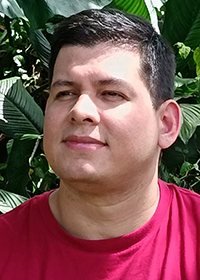 Juan Carlos Cambronero-Heinrichs (International Branch)
Juan Carlos Cambronero-Heinrichs (International Branch)
New Mexico State University
University of Padova
Juan Carlos Cambronero-Heinrichs, Ph.D., is a Costa Rican postdoctoral researcher with a Ph.D. in crop science from the University of Padua, Italy. He has published 29 scientific works, including 22 research articles, four book chapters, and three science communication pieces. With a background in microbiology from the University of Costa Rica and a postgraduate focus in entomology, his career integrates entomology and microbial ecology, emphasizing interactions between insects and other organisms. During his Ph.D., he studied ambrosia beetles, fungus-farming woodborers, many of which are invasive pests of agricultural and forestry importance. He has also worked with tropical insects such as stingless bees and triatomine bugs. In parallel, he has conducted research in environmental pollution, focusing on pharmaceuticals and pesticides in the environment, bioremediation, and the use of insects and aquatic arthropods as bioindicators in ecotoxicology.
In Italy, Cambronero-Heinrichs worked under the supervision of Professors Andrea Battisti and Davide Rassati at the Department of Agronomy, Animals, Food, Natural Resources, and Environment. He continued in the same group as a postdoctoral researcher after completing his Ph.D., extending his work on ambrosia beetles. Currently, he is starting his second postdoctoral position at New Mexico State University, collaborating with Kathryn Hanley, Ph.D., on the ecology and the transmission by insect vectors of the vesicular stomatitis virus in endemic regions of Costa Rica. Outside academia, he enjoys cooking, traveling, writing poetry, walking in the forest, and spending time with loved ones.
Hannah Chu (Pacific Branch)
City University of New York
Hannah Chu is currently a doctoral lecturer of biology in the John Jay College of Criminal Justice at the City University of New York. She earned her B.S. in forensic science from John Jay College of Criminal Justice, City University of New York, where her honors thesis explored the effects of fentanyl and its metabolites on blow fly development. Her doctoral research at the University of California, Riverside, focused on the ecological dynamics of necrophagous insects, with an emphasis on blow fly community assembly and population genetics. She hopes her research contributes to bridging fundamental ecological theory and applied fields like forensic entomology.
Beyond research, Chu is a dedicated science communicator, engaging diverse audiences through outreach, educational materials, and community collaborations. She has contributed to science communication initiatives with the California Governor's Office of Land Use and Climate Innovation, working to make science accessible and actionable.
Chu has received recognition for her research, education, and outreach efforts, including the NSF Graduate Research Fellowship and an Exceptional Remote Teaching Award. She is an active member of the Entomological Society of America, contributing to student competitions and professional development initiatives.
Outside of her professional life, Chu enjoys practicing and facilitating yoga, reading literary fiction, creating art, spending time in nature, and volunteering and spending time with her community.
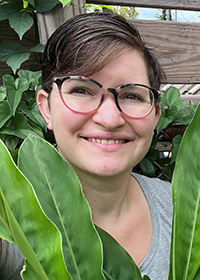 Maria Cramer (Eastern Branch)
Maria Cramer (Eastern Branch)
Rutgers University
Maria Cramer, Ph.D., is the senior coordinator of the vegetable integrated pest management program in southern New Jersey through Rutgers Cooperative Extension. In the role, Cramer supervises scouting and trapping, provides management recommendations for vegetable pests and pathogens, shares educational resources with stakeholders statewide, and conducts applied research. While the basis of the program is sweet corn IPM, Cramer studies pepper weevil and the thrips–tomato spotted wilt virus interaction.
Prior to beginning her position with Rutgers, Cramer was a postdoctoral researcher working in sweet corn IPM at the University of Maryland under Kelly Hamby, Ph.D.,, with whom she completed her Ph.D. in entomology in 2024. She received an M.S. in horticulture in 2019 from Penn State University under Richard Marini, Ph.D., and Kathy Demchak, Ph.D., with a thesis on pest management in high tunnel red raspberry production.
Cramer's doctoral research evaluated the benefits and non-target risks of at-planting insecticides in Mid-Atlantic corn production. Her dissertation used field studies on carabid communities and predation to study natural enemy impacts, and slug behavior laboratory bioassays to demonstrate that slugs can detect and avoid chemicals associated with predatory beetles. While Cramer did not find that adult carabid communities were disrupted by at-planting insecticides, she simultaneously did not find economic pests and yield benefits to justify their use. Cramer prioritized extension communication and science outreach throughout her Ph.D. to inspire stakeholders to adopt IPM. She also mentored eight students, two of whom completed undergraduate honors theses and presented talks with ESA.
Alex Harman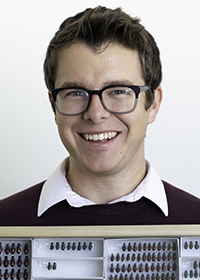 (Southwestern Branch)
(Southwestern Branch)
Santa Barbara Museum of Natural History
Alex Harman, Ph.D., has been collecting insects since he was 4 years old, and from a young age knew he wanted to pursue a career in entomology. He received his undergraduate degree in biology from the University of Wisconsin–Platteville, and his master's and Ph.D. degrees from Oklahoma State University. For his master's research, he studied the distribution of grasshopper species throughout Oklahoma, with a focus on Melanoplus macclungi, a species that was previously poorly documented and not known from Oklahoma. For his Ph.D., he focused on how land management can impact insect biodiversity, with notable projects including a study on the impact of fire on grasshopper species at the Joseph H. Williams Tallgrass Prairie Preserve and a biodiversity survey in the Ozark Mountains of Oklahoma. He also conducted population studies on Diana fritillaries, and examined the correlation between the glade butterfly surveys and observations submitted to iNaturalist, a community science platform, in the same region. During his Ph.D., Harman also worked as the museum curator and insect diagnostician for Oklahoma State University, which gave him experience in collection work and extension. He continues to volunteer his time identifying photos on iNaturalist, where he has identified over 270,000 observations. Harman is now the Schlinger Chair of Entomology at the Santa Barbara Museum of Natural History, where he continues to pursue insect biodiversity research, teaching, and conducting fieldwork to expand the insect collection.
 Sabita Ranabhat (North Central Branch)
Sabita Ranabhat (North Central Branch)
Apex Bait Technologies
Sabita Ranabhat, Ph.D., is a research scientist at Apex Bait Technologies Inc. in Santa Clara, California. She earned her Ph.D. in entomology from Kansas State University, where her research focused on integrated pest management of stored product pests at food facilities. Originally from Nepal, Ranabhat completed her B.S. in agriculture at Tribhuvan University before pursuing an M.S. in entomology at Rutgers University, where she specialized in IPM of urban pests. She has published more than 20 peer-reviewed articles and presented her work at various regional, national, and international conferences. She has held numerous leadership roles throughout her graduate program, including ESA Student Affairs Committee representative at both branch and national levels, graduate student ambassador at Kansas State, president at the Society of Overseas Nepalese Entomologists, secretary of the Graduate Student Association, and one year as FFA coordinator and two years as an outreach coordinator in Popenoe Entomology Club. She also served on an Alate Award judging panel for ESA. Throughout her academic journey, she has received numerous research awards, grants, and scholarships, reflecting her strong commitment to securing support for scientific and professional growth. Currently, as a research scientist at Apex Bait Technologies Inc., she applies her expertise in toxicology, insect behavior, chemical ecology, and integrated pest management to develop innovative products for various insect pests. She is driven by a vision to translate scientific discovery into practical impact, effectively connecting research with real-world solutions in entomology. Outside of the office, she enjoys traveling, exploring new cultures, and trying diverse cuisines.
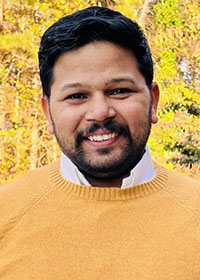 Mandeep Tayal (Southeastern Branch)
Mandeep Tayal (Southeastern Branch)
North Carolina State University
Mandeep Tayal, Ph.D., is a postdoctoral research scholar at North Carolina State University's Mountain Horticultural Crops Research and Extension Center, working with Jim Walgenbach, Ph.D. His current research focuses on investigating insecticide resistance and developing IPM strategies for management of western flower thrips (Frankliniella occidentalis) in tomatoes and peppers. He is passionate about collaborating with growers, extension specialists, and fellow scientists to develop data-driven pest management solutions for sustainable agriculture. Originally from Punjab, India, Tayal earned his B.S. in agricultural sciences from Punjab Agricultural University in 2018. He received his M.S. in biology from the University of Texas Rio Grande Valley under the mentorship of Rupesh Kariyat, Ph.D. In 2020, he received the prestigious Carl and Ruby Nettles Fellowship to pursue a Ph.D. at Clemson University, where he studied the interactions between peach trees, pollen-borne viruses, and pollinators under the mentorship of Elizabeth Cieniewicz, Ph.D. Tayal brings the unique experience of integrating molecular and applied approaches to study insect ecology, pollinator biology, and insecticide resistance. He has authored 13 peer-reviewed articles published in refereed journals, including a publication in Science. His work has been recognized with several research and travel awards, including Clemson University's 2024 Outstanding Graduate Researcher Award. Additionally, Tayal served as the president of the PES Graduate Student Association in 2022 and mentored 16 undergraduate students, many of whom are successfully pursuing careers in academia and industry. Tayal is dedicated to his research, academics, and professional development and is contributing meaningfully to the scientific community and society.
###
CONTACT: Joe Rominiecki, jrominiecki@entsoc.org, 301-731-4535 x3009
ABOUT: ESA is the largest organization in the world serving the professional and scientific needs of entomologists and people in related disciplines. Founded in 1889, ESA today has nearly 7,000 members affiliated with educational institutions, health agencies, private industry, and government. Headquartered in Annapolis, Maryland, the Society stands ready as a non-partisan scientific and educational resource for all insect-related topics. For more information, visit www.entsoc.org.
